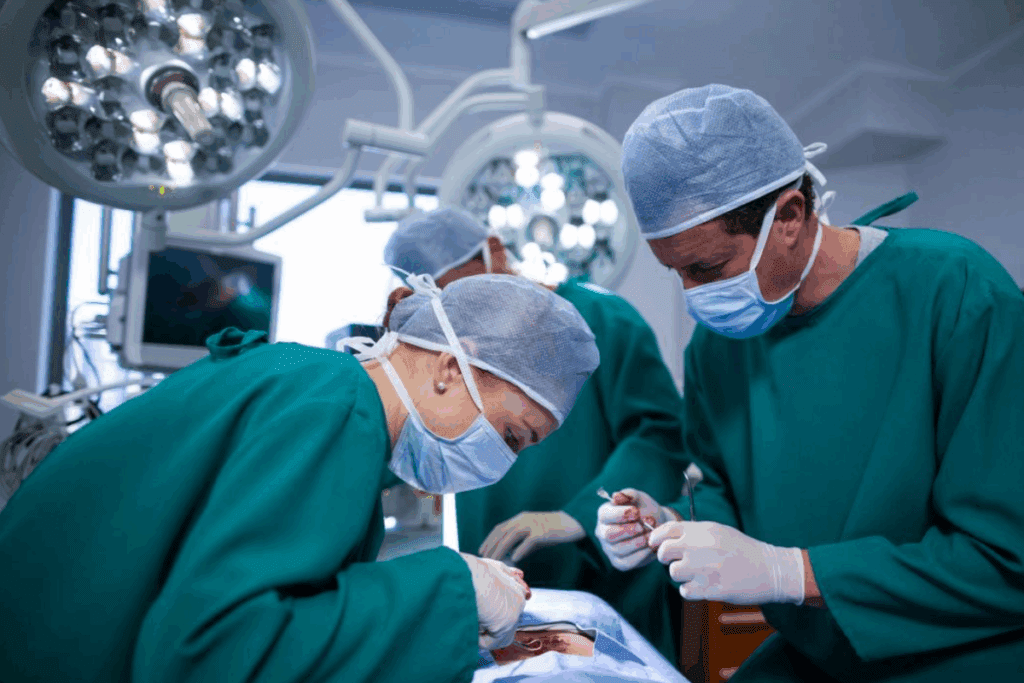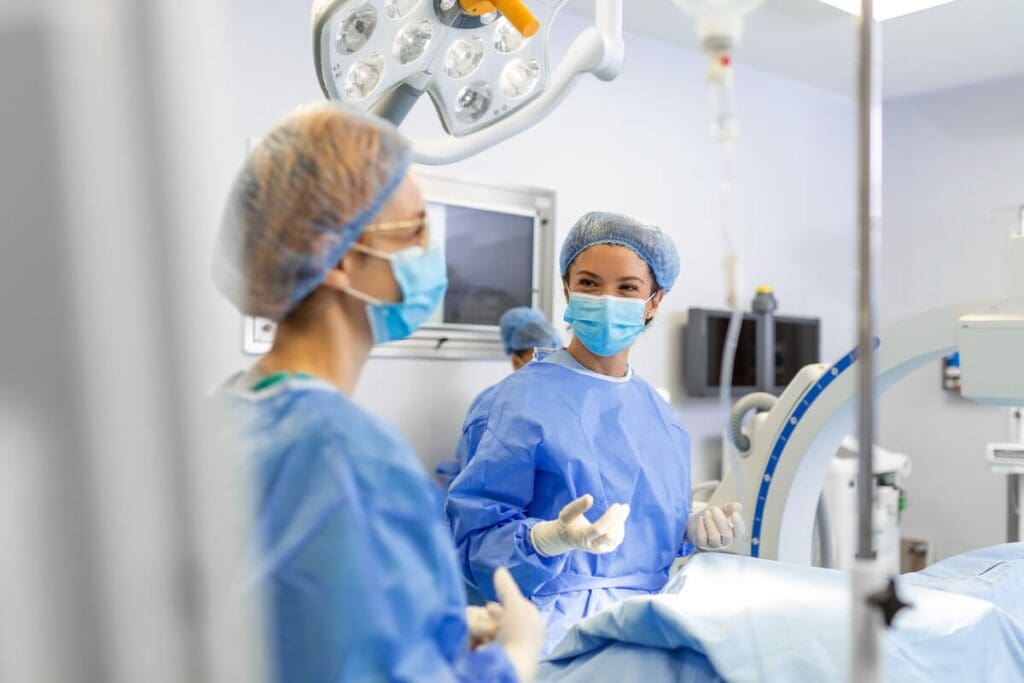Last Updated on November 24, 2025 by
The first days after hernia surgery can be tough. You might feel pain, swelling, and have trouble moving. It’s important to understand the recovery process to make it easier.
After hernia surgery, you might feel pain for a few days. You might also feel very tired and have less energy. This is all part of getting better. We suggest resting when you need to, drinking plenty of water, and following your doctor’s instructions closely. This will help you recover from hernia surgery.

It’s important for patients to understand hernia surgery and what to expect during recovery. The type of surgery and the patient’s health can affect how long it takes to recover. Hernia surgery is a common procedure to fix a hernia.

Hernia surgery can be done in two ways: open or laparoscopic. Open hernia repair involves one big cut in the belly to fix the hernia. This method is used for bigger or more complex hernias.
Laparoscopic hernia repair uses small cuts and special tools. It causes less damage and pain, leading to faster recovery and less discomfort for many.
Many things can affect how long it takes to recover from hernia surgery. These include the surgery type, age, health, and any other medical conditions. Most people can get back to normal in four to six weeks.
For example, laparoscopic surgery usually means a quicker recovery than open surgery. People with fewer health problems also tend to heal faster. This includes those without diabetes or heart disease.
Remember, everyone recovers differently. Following doctor’s orders, eating well, and having support can help your recovery. These factors can greatly influence how fast you get better.
The first days after hernia surgery are key for a good recovery. Patients face many challenges, like managing pain and getting used to moving again.
Patients may feel drowsy, nauseous, or dizzy after surgery. It’s important to manage pain well. Doctors give pain meds to help with this.
It’s important to take the pain meds as directed. Having someone help you is also a good idea. This is because anesthesia can make it hard to think clearly.
Moving around is hard at first. But it’s important to do so gently. This helps prevent stiffness and keeps blood flowing.
Most patients go home a day after surgery. Before leaving, they get tips on caring for their wound and managing meds.
Pain is usually at its worst right after surgery. This is because the body is reacting to the surgery. Mesh can add to the discomfort, but meds can help.
It’s important to stick to the pain meds schedule. Resting well is also key for healing. Try to avoid hard activities during this time.
Knowing what to expect and following care tips can make the first day easier. This helps set the stage for a smooth recovery from hernia surgery.
After hernia surgery, patients often face swelling and limited movement. Knowing what to expect and how to care for yourself can help. This knowledge can reduce risks and speed up recovery.

Swelling is common after surgery, including hernia repair. It usually peaks around days 4-7 post-surgery. But, it’s important to watch for signs of trouble, like more redness, warmth, or pain.
Some swelling is okay, but severe swelling or other symptoms mean you should call your doctor. Elevating the area and using ice packs can help with swelling.
In the first week, movement is limited, and you need to be careful. Use proper body mechanics and move slowly to avoid injury.
In the early healing phase, following activity restrictions is key. Avoid heavy lifting, bending, or strenuous activities to protect the surgical site.
Focus on slow, gradual movement and follow your doctor’s advice on hernia recovery time and recovery time for hernia surgery.
“Rest and patience are key during the initial healing phase. It’s important to listen to your body and not rush back into normal activities too quickly.”
In weeks 3-6, you can start to return to normal activities. This is a time of significant improvement, with less discomfort and more mobility.
But, be careful not to overdo it. Gradually increase activity levels and listen to your body for a full recovery.
Understanding the recovery process helps patients navigate their recovering hernia surgery journey. This approach minimizes complications and ensures a smoother return to daily life.
Complications after hernia surgery are rare but can affect recovery time. Most patients do well, but knowing about possible issues helps. It ensures quick medical help if needed.
Infection is a big worry after hernia surgery. Look out for redness, swelling, more pain, and fever. To avoid infection, clean the wound as told by your doctor. Watch for any unusual signs.
Prevention Strategies:
Mesh problems, like it moving or reacting, can happen. Chronic pain is another issue, possibly from nerve damage or mesh.
Chronic pain concerns need a detailed plan. This might include meds, physical therapy, or more surgery.
Key Considerations:
Knowing about possible complications and acting early can make recovery better. Being informed and watchful helps patients face surgery challenges.
Knowing how to set up a supportive recovery area is vital for less pain after hernia surgery. A few simple changes at home and in your daily life can greatly help your recovery.
Having a cozy and safe spot at home is essential for a smooth recovery. Here are some easy tips:
By following these steps, you can lower the chance of problems and make your recovery easier.
Your diet is very important after hernia surgery. The right foods can help avoid constipation and aid in healing.
By eating right, you can reduce pain and make your recovery smoother.
Recovering from hernia surgery needs patience and the right support. By setting up a recovery-friendly space and choosing the right foods, you can get through tough days more easily.
Recovering from hernia surgery needs patience, commitment, and taking care of yourself. The first few days after surgery are usually the toughest. Knowing the recovery timeline, managing your care, and watching out for complications are key to success.
By following the advice in this article, you can make your hernia repair recovery smoother. It’s all about being patient, taking care of yourself, and following your doctor’s advice. This will help you recover well from hernia surgery.
Remember, how long it takes to recover from inguinal surgery varies. It depends on the surgery type and your health. Being informed and ready can help you manage your recovery. This way, you can look forward to a full recovery.
The first days after hernia surgery can be tough. You might feel pain, swelling, and have trouble moving. Rest when you need to, drink plenty of water, and follow your doctor’s advice to help you heal.
Recovery time for hernia surgery varies. It depends on the surgery type, hernia size and location, and your health. Laparoscopic surgery often means quicker recovery because of smaller cuts and less damage.
Open surgery uses a bigger cut, while laparoscopic uses smaller cuts and a camera. Laparoscopic surgery usually means less damage and faster healing.
Managing pain after surgery is key. Stick to your pain meds and rest when you can. This helps control pain and discomfort.
Watch for signs of infection like redness, swelling, more pain, and fever. If you notice these, get medical help right away.
To avoid constipation, eat a balanced diet with lots of fiber. Stay hydrated and avoid foods that can make you constipated.
When you can go back to normal activities depends on your healing. Start with small steps, avoid heavy lifting, and follow your doctor’s advice.
Mesh complications include infection, adhesions, and chronic pain. Though rare, they can happen. Be aware of signs and seek help if you notice anything unusual.
Make your home recovery-friendly by keeping essentials within reach. Have someone help with daily tasks and keep your space clutter-free to avoid falls.
Schaaf, S., et al. (2021). Recommendations on postoperative activities after laparoscopic surgery. Surgical Science, 12, 345-352. https://www.ncbi.nlm.nih.gov/pmc/articles/PMC8511488/
Raj, V., & Patil, V. (2025). A prospective study on postoperative pain and recovery in laparoscopic versus open inguinal hernia repair. International Journal of Academic Medicine and Pharmacy, 7(3), 1024-1029. https://academicmed.org/Uploads/Volume7Issue3/198.%205372.%20JAMP_Raj_1024-1029.pdf
Subscribe to our e-newsletter to stay informed about the latest innovations in the world of health and exclusive offers!